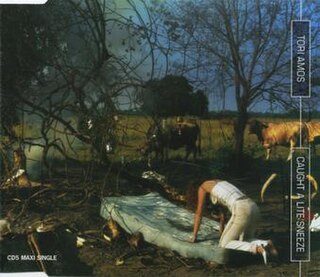
"Come Undone" is a song by British band Duran Duran. It was released in March 1993 as the second single from the album Duran Duran . It is their 24th single overall. With their commercial and critical success reestablished by the previous single "Ordinary World", "Come Undone" continued to showcase more of the band's entry into the adult contemporary radio format.

"Truly Madly Deeply" is a song by Australian pop duo Savage Garden, released in March 1997 as the third single from their self-titled debut album (1997) by Roadshow and Warner Music. It won the 1997 ARIA Music Award for both Single of the Year and Highest Selling Single, and was nominated for Song of the Year. Written by bandmates Darren Hayes and Daniel Jones, the song is a reworking of a song called "Magical Kisses" that the pair wrote together during the recording of their debut album.

"Kids" is a duet between singers Robbie Williams and Kylie Minogue, released as the second single from Sing When You're Winning, Williams' third studio album, and the third single from Light Years, Minogue's seventh studio album. Williams and his then songwriting partner Guy Chambers co-wrote the song for Minogue.

"You're Still the One" is a song recorded by Canadian singer Shania Twain. It was released as the third single from her third studio album Come On Over (1997). The song was written by Twain and Robert John "Mutt" Lange and produced by Lange. It was released in the US on January 27, 1998, and was Twain's first single to be released to pop radio.

"Dreams" is a song by British-American rock band Fleetwood Mac from their eleventh studio album, Rumours (1977). In the United States, "Dreams" was released as the second single from Rumours in March 1977, while in the United Kingdom, the song was released as the third single in June 1977. A stage performance of "Dreams" was used as the promotional music video.

"Babylon" is a song by British singer-songwriter David Gray. Originally released on 12 July 1999 as the second single from his fourth album, White Ladder (1998), it was re-released as the fourth single on 19 June 2000. "Babylon" peaked at number five on the UK Singles Chart in June 2000 and received a platinum certification from the British Phonographic Industry (BPI) in January 2021. The single also charted in the United States, peaking at number 57 on the Billboard Hot 100 and number one on the Billboard Adult Alternative Songs chart.

"I Wanna Be With You" is a song by American singer Mandy Moore. It was released as the lead single from Moore's reissue of the same name (2000) on April 11, 2000, one day after Moore's 16th birthday. The song received positive reviews from critics. It peaked at number 24 in the United States Billboard Hot 100, becoming Moore's first and only top 30 single in the US to date. The song also peaked at number 13 in Australia and was certified Gold by ARIA. It also peaked at number 21 in the UK, 66 in Austria and 70 in Germany. The song was featured on the soundtrack to the 2000 film Center Stage. The music video for the song, directed by Nigel Dick, showed Moore singing the song to her love interest in a dance studio.

"Sweetest Thing" is a song by Irish rock band U2. It was originally released as a B-side on the "Where the Streets Have No Name" single in 1987. The song was later re-recorded and re-released as a single in October 1998 for the band's compilation album The Best of 1980–1990.

"Move Your Feet" is a song by Danish pop duo Junior Senior from their debut studio album, D-D-Don't Don't Stop the Beat (2002). The song, originally released in 2002 in the duo's native Denmark, was issued worldwide in 2003 and became Junior Senior's biggest hit, reaching No. 4 in Denmark, No. 3 in the United Kingdom, and No. 20 in Australia. A music video for the song, directed by British art collective Shynola, was created using low-resolution pixel art.

"It's All Been Done" is a song by Canadian alternative rock group Barenaked Ladies. It was released as the second single from their 1998 album, Stunt. The song was successful in Canada, peaking at No. 1 on the RPM Top Singles chart and becoming the band's highest-charting song in their native country. The song was used as the theme song for the television series Baby Blues. The song is also notable for being one of the band's first to feature an electric guitar solo by Ed Robertson.

"If You Come Back" is a song by English boy band Blue, released as the third single from their debut studio album, All Rise (2001). It was written by Ray Ruffin, Nicole Formescu, Ian Hope, and Lee Brennan of boy band 911. The song topped the UK charts for one week becoming their second consecutive number one single release and has received a silver sales status certification for sales of over 200,000 copies in the UK.

"Too Close" is a song by American R&B group Next featuring uncredited vocals from Vee of Koffee Brown. It contains a sample of "Christmas Rappin" by Kurtis Blow and was released on January 27, 1998, as the second single from their debut album, Rated Next (1997). The song reached number one on the US Hot 100 and R&B charts and has gone platinum, making it their biggest and best-known hit.

"To the Moon and Back" is a song by Australian pop duo Savage Garden. It was released in Australia on 4 November 1996 as the second single from their self-titled 1997 album. It was the follow up to their hit "I Want You". It won the 1997 ARIA Music Award for Song of the Year. The song became the band's first number-one single in their native country, reached number three on the UK Singles Chart, and peaked at number 24 on the US Billboard Hot 100.

"The Way You Make Me Feel" is a song by Irish singer-songwriter Ronan Keating from his debut solo album, Ronan. It was released as the third single from the album on 20 November 2000. The song peaked at number six on the UK Singles Chart. The song was written by English songwriter Phil Thornalley and Canadian singer-songwriter Bryan Adams, who both provide backing vocals on the track. In 2004, the song was re-recorded for Keating's greatest hits album, 10 Years of Hits, featuring vocals from Adams.

"Hands" is a song by American singer Jewel, released as the first single from her second studio album, Spirit (1998). Jewel wrote the song following an incident in which she considered stealing a sundress after getting fired from various jobs due to kidney troubles, and she decided that her hands were better suited to writing songs than stealing clothes. Written as one of the last songs for the album, the lyrics express how the smallest decisions have the power to make change. A piano-driven ballad, the song was serviced to American radio stations on October 7, 1998, ahead of its planned release date of October 19 due to a radio leak in Dallas, Texas.

"Here with Me" is the debut single of English singer-songwriter Dido. It was the first single she released from her 1999 debut studio album, No Angel. The song was written about her then-boyfriend Bob Page. The single was released on 17 May 1999 in the United States but was not released in the United Kingdom until February 2001, serving as Dido's debut single in her home country. In other territories, it was issued as the album's second single, following "Thank You". Shortly after its release, "Here with Me" was used as the theme song for the American science fiction television programme Roswell (1999–2002).

"Almost Unreal" is a song by Swedish pop music duo Roxette, released on 10 May 1993 as the lead single from the soundtrack of the 1993 live action adaptation of Super Mario Bros., which starred Bob Hoskins, John Leguizamo, Dennis Hopper, and Samantha Mathis. The song became a top-20 hit in numerous territories, including Scandinavia, Ireland and the UK. It would also be the duo's final top ten hit in the latter two countries, excluding a re-release of "It Must Have Been Love" two months later. The song proved to be unsuccessful in North America, peaking at number 94 on the Billboard Hot 100, although it performed better in Canada, where it peaked within the top 30. It appeared as a bonus track on the Japanese edition of their next studio album, Crash! Boom! Bang! (1994), mis-titled "It's Almost Unreal".

"Last Request" is the debut single by Scottish singer-songwriter Paolo Nutini, from his 2006 debut album, These Streets. The song was released on 3 July 2006, and peaked at number five on the UK Singles Chart and number 15 on the Italian Singles Chart. The song's lyrics describe a person who knows his relationship is over, but he wants to have one last time with his partner.

"No Matter What" is a song from the 1996 musical Whistle Down the Wind that was popularised by Irish boyband Boyzone in 1998 when they recorded it to tie in with the show's first UK production. The song was written by Andrew Lloyd Webber and Jim Steinman, while Lloyd Webber, Steinman and Nigel Wright produced the track, with additional production by Franglen & Lupino. The song was also featured on the US edition of the soundtrack to the 1999 film Notting Hill, and was released to American radio on 10 May 1999.

"Caught a Lite Sneeze" is a song by American singer-songwriter Tori Amos, released as the first single from her third studio album, Boys for Pele (1996), on January 1, 1996. The song is about wanting to do anything to keep a relationship going, knowing that it is over. It references Nine Inch Nails's album Pretty Hate Machine in the lyrics "Caught a lite sneeze / Dreamed a little dream / Made my own pretty hate machine." On December 11, 1995, Atlantic Records made the song available for streaming on their website, one of the earliest examples of a major label implementing such a feature.




















